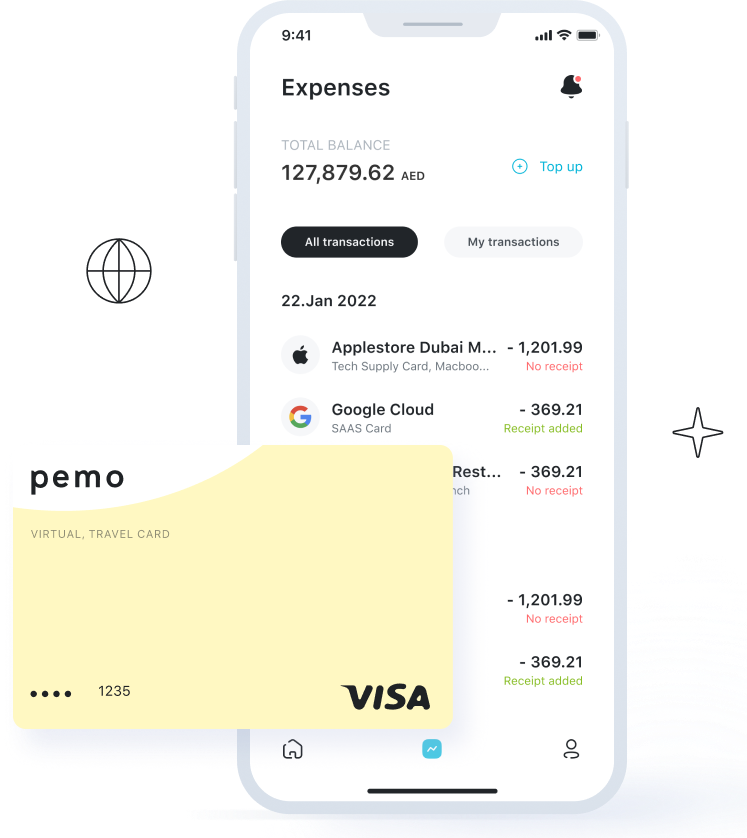Simplifying Corporate Spend in MENAP: Our Investment in Pemo
If you google “spend management startup raises… ” you’ll realize 2021 was the “Year of the Spend Manager.” With the amount of activity and funding the segment has received, it was hard to keep up. Whether you are Brex or Ramp in the US, Yokoy in the EU, Clara or Jeeves in Latin America, or Spenmo in Southeast Asia, the segment has attracted unprecedented interest from investors worldwide.
Why then, is corporate cards and spend management fintech’s gift that keeps on giving?
Tapping into two massive verticals
One answer may lie in the fact that corporate card players have the possibility to tap into two fintech verticals within B2B (and two particularly massive market opportunities): lending and payments.
Not only do they help businesses manage their spend, but, in doing so, they also make it so companies can pay non-payroll expenses more efficiently. Even better, they lend you the capital to do it. When the market for B2B payments is $125 trillion globally (yeah…with a “t”), and estimates for the SME credit gap worldwide are as high as $2 trillion, you can see why founders are rushing to use technology to overhaul outdated systems and capture a slice of these market pies.
The difficult of scaling internationally
The second is that B2B fintech doesn’t scale well internationally. Infrastructure and payments rails vary wildly across regions. What a business in Berlin spends its money on will be very different compared to one in Jakarta. Some countries’ rails are more digitized than others, causing them to move away from cash or checks (e.g. the EU for the most part). By contrast, some countries still operate with local payment methods that have sprung out of necessity (e.g. Boletos in Brazil).
It’s a good thing Financial Services are not a very regulated industry. If they were, imagine trying to navigate licenses, fine print, local politics and multiple regulatory bodies in each of the countries you are trying to expand to.
Oh wait! Trying to do all of the above while keeping the business healthy in your original market IS extremely difficult. In order to successfully expand, then both infrastructure and regulation have to be relatively similar. This usually only happens at the regional level. Think the European Union or Latin America.
It’s no surprise then that solutions looking to address this problem have sprung up across multiple countries and regions, each with its own local market nuance. We recently analyzed the massive potential of the model when it’s paired with an incredible team. And when we saw a similar startup, with another set of amazing founders in one of the last “untouched” markets, we jumped at the opportunity to be involved.
The pain of outdated and legacy spend systems
As one of the last virgin markets for the corporate card and expense management model, the GCC, Egypt and Pakistan (or if you’re into acronyms: the MENAP) region is home to 450M people and 11.5M SMEs. While most of the banks there have digital capabilities and online portals, it's exactly what you would expect from legacy players building new technology.
The portals are slow and outdated. Bills, if digital (and that’s a big if), are often received via multiple channels and platforms. As a result, manual reconciliation is a fact of life for SME finance teams operating there. The picture becomes even murkier when you add-in the fact that a lot of these SMEs handle cross-border transactions with high transfer and FX costs.
Given its strategic connection to Europe and Asia, the region is home to a variety of international businesses – a category SMEs are not excluded from. Now, while large enterprises have access to bespoke hedging practices with partner banks, SMEs can’t afford that luxury and have to manage it in-house, assuming they can at all. A practice that leads them to pay much higher FX fees on international bank transfers.
And while the penetration of personal cards is high amongst the population, the concept of a corporate credit card is virtually non-existent for small businesses. This leads business owners and employees to use their personal cards to pay for business expenses, making reconciliation for their finance teams all the more difficult.
Which is where Pemo comes in.
Pemo: Making sense of spend management

All of the above set the stage perfectly for Pemo’s product. At its core, Pemo is simplifying accounts payable management. Starting with bill payments, the startup allows you to capture bills and extract data from multiple sources using AI, create an audit and approval trail behind them and pay them with the click of a button. Their integration with a variety of FX providers and consolidation across multiple businesses will allow them to access best-in-class rates on international transactions.
In addition, Pemo provides businesses with a corporate card that allows employees to make online and offline purchases on behalf of the business while keeping all purchase data within the company's system. This will allow Pemo to access and analyze the spending data of their customers and get a view into the performance of their businesses. Through cash flow based underwriting, they will eventually be able to set credit limits on the cards and help businesses manage their cash flows by funding those expenses.
By bringing all bills into a single platform, expense reconciliation is automated and consolidated across all the different segments of business spend. A quick integration with a company's accounting system allows SMEs to holistically view how their business is developing and make data-driven decisions accordingly.
Establishing a regional leader

As we’ve touched upon already, local market understanding with its accompanying regulatory navigation is key for this particular business model.
Ayham, Alessandro and Valerie’s complementary knowledge and skills perfectly position them to traverse tricky infrastructure and regulation. With Ayham’s experience building businesses in the region for the past 15 years, Alessandro previously running one of the largest e-commerce marketplaces in MENA, and Valerie at the helm of international expansion for Pleo, it's no wonder they’ve been able to secure partnerships with local banks and FX providers as well as starting to establish operations beyond UAE and into Saudi Arabia.
Their passion for the product and vision to establish a regional winner was contagious. We could not wait to partner with Pemo, along with our friends at Cherry Ventures and Shorooq Partners, on their journey to revolutionize B2B payments and lending in MENAP.
Learn more about the Speedinvest Fintech team and sign up for our newsletters to get our exclusive content delivered straight to your inbox.













.svg)
